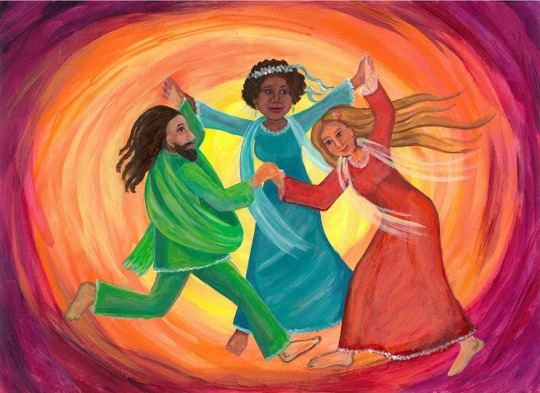#Miroslav Volf
Text

18 notes
·
View notes
Text

“The idea of flourishing as a human being has shriveled to meaning no more than leading an experientially satisfying life. The sources of satisfaction may vary: power, possessions, love, religion, sex, food, drugs—whatever. What matters most is not the source of satisfaction but the experience of it—my satisfaction. Our satisfied self is our best hope. Not only is this petty, but a dark shadow of disappointment stubbornly follows our obsession with personal satisfaction. We are meant to live for something larger than our own satisfied selves. Petty hopes generate self-subverting, melancholy experiences.”
- Miroslav Volf, A Public Faith
2 notes
·
View notes
Text
After all, it's our sense of Smokey responsibility that grounds the possible gap between the life we want and the life worth living. Without it, all we have is our desires. Questions of worth—of value—appear only when we have to take seriously the possibility that we answer to someone or something beyond our desires—whether family, God, reason, or something else entirely. It's Smokey responsibility that gives teeth to the "oughts" of the questions we're about to ask.
—Miroslav Volf, Matthew Croasmun, and Ryan McAnnally-Linz, Life Worth Living: A Guide to What Matters Most
0 notes
Text
THE GOOSE CHASE | ACTS OF THE SPIRIT (ACTS)
THE GOOSE CHASE | ACTS OF THE SPIRIT
'The Holy Spirit, like Miss Rabbit, is the glue pulling and holding this community together, and the driving force that keeps this community moving forward.'
Here’s my longer sermon notes from this morning’s Metro Christian Centre service (dated 5th Nov. 2023), session six in our series on the Holy Spirit.
You can also catch up with this via MCC’s YouTube channel (just give us time to get the video uploaded).
‘Where the church is, there is also the Spirit of God; where the Spirit of God is, there is also the church and all grace’
Irenaeus[i]
‘The…

View On WordPress
#Acts#Acts of the Apostles#Acts of the Spirit#Amos Yong#Azuza Street#community#diversity#Holy Spirit#Jack Levison#Jane Williams#Miroslav Volf#Miss Rabbit#Peppa Pig#Scot Mcknight#Wild Goose#William Seymour#Willie James Jennings
1 note
·
View note
Text
Imitating the Trinity in Our Common Life
The Church exists to participate in the life of God, and to enable others to do the same. We exist to make divine communion not just an inner experience but a public truth. We don’t just feel Love’s eternal dance. We live it. We show it. We share it.
Windows, south nave of León Cathedral on the Camino de Santiago.
I was walking instead of writing in May, on pilgrimage along St. Cuthbert’s Way from the Scottish Borders to Holy Island in Northumbria. More on that soon. Meanwhile, I’m preaching the following for Trinity Sunday at my home parish, St. Barnabas Episcopal Church on Bainbridge Island, Washington. Some of it has appeared before on…

View On WordPress
#Catherine LaCugna#Communion#Divine nature#God#God in three persons#God is love#Hadewijch of Antwerp#Holy Spirit#Holy Trinity#I John 4:16#Jesus#John D. Zizoulas#John Lennon#Miroslav Volf#Perechoresis#The Church#Trinity Sunday#Wallace Stevens
1 note
·
View note
Text
“Though I used to complain about the indecency of the idea of God’s wrath, I came to think that I would have to rebel against a God who wasn’t wrathful at the sight of the world’s evil. God isn’t wrathful in spite of being love. God is wrathful because God is love.”
— Miroslav Volf
14 notes
·
View notes
Text
The Holy Trinity (Pakistan artist)
Asher Sidhu is a Christian artist with a gallery and art school in Rawalpindi, Pakistan.
https://www.facebook.com/Sidhusgallery
https://www.sidhusgallery.com/
https://www.instagram.com/artist.ashersidhu.official/
Here is his panting "The Holy Trinity" completed in December 2023:

He references this Bible verse in the FB post:
May the grace of the Lord Jesus Christ, and the love of God, and the fellowship of the Holy Spirit be with you all. (2 Corinthians 13:14)
+++
Because the Christian God is not a lonely God, but rather a communion of three persons, faith leads human beings into the divine communion. One cannot, however, have a self-enclosed communion with the Triune God- a “foursome,” as it were– for the Christian God is not a private deity. Communion with this God is at once also communion with those others who have entrusted themselves in faith to the same God. Hence one and the same act of faith places a person into a new relationship both with God and with all others who stand in communion with God.
― Miroslav Volf
5 notes
·
View notes
Text
“There are people who think that in relation to God, repentance comes before forgiveness. But that can’t be right. God doesn’t angrily refuse forgiveness until we show ourselves worthy of it by repentance. Instead, God loves us and forgives us before we repent. Indeed, before we even sinned, Jesus Christ died for our sins. God’s forgiveness is not reactive—dependent on our repentance. It’s original, preceded and conditioned by absolutely nothing on our part.”
— Free of Charge: Giving and Forgiving in a Culture Stripped of Grace by Miroslav Volf
14 notes
·
View notes
Text
Perichoresis
Perichoresis (from Greek: περιχώρησις perikhōrēsis, "rotation") is a term referring to the relationship of the three persons of the triune God (Father, Son, and Holy Spirit) to one another. Circumincession is a Latin-derived term for the same concept. It was first used as a term in Christian theology, by the Church Fathers. The noun first appears in the writings of Maximus Confessor (d. 662) but the related verb perichoreo is found earlier in Gregory of Nazianzus (d. 389/90). Gregory used it to describe the relationship between the divine and human natures of Christ as did John of Damascus (d. 749), who also extended it to the "interpenetration" of the three persons of the Trinity, and it became a technical term for the latter. It has been given recent currency by such contemporary writers as Jürgen Moltmann, Miroslav Volf, John Zizioulas, Richard Rohr, and others.
Since Christians believe humans are made in the image of God, a Christian understanding of an adequate anthropology of humans' social relations is informed by the divine attributes, what can be known of God's activity and God's presence in human affairs. Theologians of the Communio school such as Hans Urs von Balthasar, Henri de Lubac, and Joseph Ratzinger (later Pope Benedict XVI) locate the reciprocal dynamism between God and God's creatures in the liturgical action of sacrament, celebrating the sacred mysteries in Eucharistic communion, in a hermeneutic of continuity and apostolic unity.

The relationship of the Triune God is intensified by the relationship of perichoresis. This indwelling expresses and realizes fellowship between the Father and the Son. It is intimacy. Jesus compares the oneness of this indwelling to the oneness of the fellowship of his church from this indwelling. "That they all may be one; as thou, Father, art in me, and I in thee, that they also may be one in us" (John 17:21). The great 12th century Cistercian reformer St. Bernard of Clairvaux spoke of the Holy Spirit as the kiss of God, the Holy Spirit being thus not generated but proceeding from the love of the Father and the Son through an act of their unified will.
If, as is properly understood, the Father is he who kisses, the Son he who is kissed, then it cannot be wrong to see in the kiss the Holy Spirit, for he is the imperturbable peace of the Father and the Son, their unshakable bond, their undivided love, their indivisible unity. – St. Bernard of Clairvaux, in Sermon 8, Sermons on the Song of Songs
The Cappadocian Fathers described the Trinity as three individualities in one indivisible being, asserting that Christian community is an analogy:[citation needed] that the social trinitarianism is—in Eastern Orthodox terminology—an "icon" or sign of God's love. Such a conception refutes the adoptionism which some attribute to the Anomoeans (an "Arian" sect) and other anti-trinitarians, which reduce the conception of the unity of God in Christ to a purely ethical concept, strictly comparable to a human relationship between two (or three) individuals. In contrast, the basis for human relationship pointed to by the Cappadocian Fathers is within God as such, not in God in relation to another that is not God.
[Source]

10 notes
·
View notes
Text
Miroslav Volf writes that a God without wrath is one of many "pleasant captivities of the liberal mind." The true God must be as indignant about injustice as we are, for the gospel is neither sentimentality nor is it, despite what you'd think from many presentations of it, bad news. The hard-nosed realism of the gospel is that the wrath to which God has every right has been silenced through the cross of the Son. The hope of the gospel is that he shall come again to make all right that remains broken in the good gift of his creation.
~Jason Micheli, The Mockingbird Devotional, vol. 2, 407.
1 note
·
View note
Text
"There is a commandment in First Peter, two words: 'Honor everyone.' Which means I need to listen to them, which means I need to open myself up to see whether I can learn something from a person with whom I profoundly disagree." Miroslav Volf, Yale University theology professor.
0 notes
Text
Kant's view of moral autonomy has been incredibly influential in the modern era. Unsurprisingly, however, there are significant challenges to it. For one thing, insisting that humans are essentially rational beings and that human dignity comes from our rationality seems to deny dignity to people with limited cognitive capacities. For another, Kant's supposedly universal reason can look suspiciously parochial, like the habits and inclinations of a highly educated, well-off European man.
—Miroslav Volf, Matthew Croasmun, and Ryan McAnnally-Linz, Life Worth Living: A Guide to What Matters Most
0 notes
Text
what does it mean to be alive? What responsibilities, if any, does this gift come with? Here we begin to find ourselves at a point of divergence, for there are many schools of thought on what it means to live a good and ethically sound life.
What matters most? What does a flourishing life look like? And, who do we answer to? What is worth wanting?
how big is your forest? Remember the Smokey responsibility? Well, one important question within that is how big are you going to make your forest — or, how far are you going to extend your sphere of responsibility?
One of the tools he developed in maintaining his newfound, late-in-life devotion to theology was the examen. It is essentially a daily prayer, but it takes the form of five parts.
The first is gratitude: reflecting on your day and acknowledging the good parts.
Second is review: go a bit deeper into your reflection and think about the times where you might have felt God’s presence, and when you might have turned away from that presence.
Third is sorrow: acknowledge the actions of the day for which you are sorry.
Fourth is forgiveness: ask for forgiveness and make plans to reconcile with those you may have hurt, or those who have hurt you.
Fifth is grace: look ahead to tomorrow and ask for God’s grace and to be more mindful in recognizing God’s presence.
There are many different visions of a good life out there. This isn’t a life of comfort and wealth. Rather, it is a meaningful life where you flourish in the pursuit of your values and ideals, perhaps making the world a place where other people can also flourish. Finding your own vision of the good life may involve piecing together the harmonious aspects of different visions from the past and asking tough questions about what you really believe in.
0 notes
Text
Yale-Professor: Amerikaner „fremdeln“ mit Jesus
Für den Yale-Theologen Miroslav Volf unterscheidet sich die Kirche in den USA kaum noch von der Politik und gesellschaftlichen Trends. Darin liege ein Grund für ihren Niedergang. Auch weil die Menschen mit Jesus kaum noch etwas anfangen können.
weiterlesen:
[https://www.pro-medienmagazin.de/yale-professor-amerikaner-fremdeln-mit-jesus/
View On WordPress
0 notes